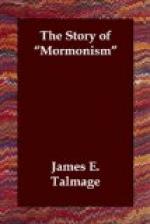I believe that strategy is usually allowed in war, and I am free to say the “Mormons” availed themselves of this license. At short intervals in the course of the night-passage through the canyon, the party was challenged, and the password demanded; bon-fires were blazing down in the gorges, and the impression was made that the mountains were full of armed men; whereas the sentries were members of the escort, who, preceding by short cuts the main party, continued to challenge and to pass. On their arrival, the gentlemen were met by the retiring officials, and were peaceably installed. The new governor called upon the clerk of the court, and ascertained the truth of the statement that the records were entirely safe. He promptly reported his conclusions to General Johnston that there was no further need for the army. It was decided, however, that the soldiers should be permitted to march through the city, and straightway the “Mormons” began their exodus to the south.
Governor Cumming tried in vain to induce the people to remain, assuring them that the troops would commit no depredations. “Not so,” said Brigham Young, “we have had experience with troops in the past, Governor Cumming; we have seen our leaders shot down by the demoralized soldiery; we have seen mothers with babes at their breasts sent to their last home by the same bullet; we have witnessed outrages beyond description. You are now Governor of Utah; we can no longer command the militia for our own defense. We do not wish to fight, therefore we depart.” Leaving a few men to apply the brand to the combustibles stored in every house, at the first sign of plunder by the soldiers, the people again deserted their homes and moved into the desert anew.
But the officers of the army kept their word; the troops were put into camp forty miles from the settlements, and the settlers returned. The President’s commissioners brought the official pardon, unsolicited, for all acts committed by the “Mormons” in opposing the entrance of the army. The people asked what they had done that needed pardon; they had not robbed, they had not killed. But a critical analysis of these troublous events revealed at least one overt act—some “Mormon” scouts had challenged a supply train; and, being opposed, they had destroyed some of the wagons and provisions; and for this they accepted the President’s most gracious pardon.
CHAPTER V
After all, the “Mormon” people regard the advent of the Buchanan army as one of the greatest material blessings ever brought to them.
The troops, once in Utah, had to be provisioned; and everything the settlers could spare was eagerly bought at an unusual price. The gold changed hands. Then, in their hasty departure, the soldiers disposed of everything outside of actual necessities in the way of accouterment and camp equipage. The army found the people in poverty, and left them in comparative wealth.




